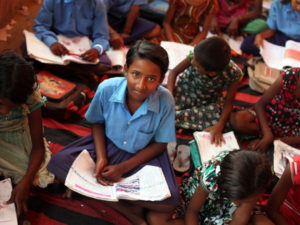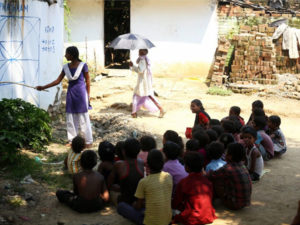Detention – Failing Students or Failing Education
Detention cannot act as a substitute to quality learning and teaching process. The need to attract students to school has to be supplemented with a better education environment.
I

n November 2017, a class eleven student at the Ryan International School confessed to slitting the throat of a seven-year-old student, Pradyumn Thakur. Shocking as the crime was, the reason behind it left a big question mark on the Indian education system. The student, believed to be weak in his studies committed the crime to postpone a scheduled examination and a parent teacher meeting.
The fear of exams, evaluations and the results of failure have scaled to such heights that the students are now resorting to criminal activities of the highest degree.
“A single life lost at the behest of our education and evaluation structure is more than enough to stimulate a rigorous relook into the structure of our education system.”
But, as unbridled as it could be, the upcoming monsoon session of the Parliament is likely to introduce the Second Amendment to the Right of Children to Free and Compulsory Education (RTE) Act. Section 16 of the said Act provides for the ‘No Detention Provision’ till a child completes his/her elementary education, i.e. till class eighth. The amendment to the said Act aims to scrap this provision. The Amendment introduces a regular examination to be held at the end of class five and class eight, and if a child fails, he will have to undertake additional instructions and give a re-examination. Failing in the re-examination would allow the school to detain the child.
The 59th meeting of the Central Advisory Board of Education (CABE) had a detailed analysis of the impacts and consequences of the said policy. It is to be noted further that out of the states which responded about their stand on the said provision, 18 were against the ‘No Detention Policy’ (NDP). The reason for their displeasure with the policy is that lack of fear of failure leads to a lackadaisical attitude of the students and teachers towards substantive learning. Secondly the number of students failing their ninth and tenth class examinations has been on a rise since the blanket cover on their failure has been eroded.
Is Detention The Solution?
What attracts considerable attention to the issue is the large number of studies and research pointing out that detention is not the solution to qualitative learning; detention, on the contrary, is an impediment to the learning and retention process. This is the reason why the said policy has been adopted by several of the high performing education systems across the globe. In their written submission to the Parliamentary Standing Committee regarding reintroduction of detention at elementary level, Care India, an NGO working for the empowerment of women and girls has come up with a number of arguments against the proposed amendments and the challenges that it would pose.
The report by Care India tells us that the pass percentage of the students of CBSE class 10 in 2009, i.e. pre-NDP was 88 per cent and the same in 2012 was around 98 per cent, an increase of 10 per cent. Since the policy is aimed and targeted towards first generation learners and other students of rural and under privileged background, doing away with this provision and bringing back the pass-fail system would lead to these students never returning to their schools.
“The proposed amendment is anti-child and anti-legal. Lack of qualified teachers and misapplication of CCE are system’s failures. Students of poor and marginalised society should not suffer at the cost of system’s failure to provide quality education.”
Ambarish Rai, National Convener- Right to Education Forum
Going Back To Basics

A lot of hue and cry is made with respect to dropouts, but what demands actual attention is the effort of eliminating the reasons behind it. The process of learning cannot be stimulated out of fear of failure and detention; there is a need for a more fundamental change in the whole teaching curriculum which needs to be made more student-centric and responsive to their interests and needs.
Prof. Nalini Juneja, an expert in educational management, policy and legislation on compulsory primary education, in her article titled ‘Policy Lessons for Inclusion from the Fate of the CCE Within the Performativity Culture in Education’, states that the scheme of Continuous Comprehensive Evaluation (CCE) rolled out under the Act could have done wonders, only if it could have been properly understood and applied to achieve what it aimed at. The ‘culture of performativity’ and the ‘obsession with testing, and recording grades’ need to be done away with and a more ‘feedback- oriented approach’ needs to be adapted so that every child undergoes learning rather than achieving the aim of merely completing a particular number of years in school.
The Finance Minister in his budget speech this year paved the way for digitising the classrooms by installation of digital boards in place of traditional blackboards.
“While the move is aimed at revolutionising the classroom culture, the irony is that there are still several thousand rural primary schools which struggle to secure the minimum standards of infrastructure.”
Lakhs of teachers in the country are still untrained. To address the said issue, First Amendment to the RTE Act was passed, thereby increasing the deadline for these teachers to complete their Bachelor of Education (B.Ed.) and other professional degrees. As per RTE Forum, the various other factors that contribute to the low learning outcomes of the children are lack of infrastructure, inability of parents to assist in the learning process and inadequacy of classrooms.
The system then cannot shift the burden of its failure to provide quality education in a quality manner by qualified teachers, onto the students who are mere victims of the same. It is not the children failing, but the system that is. It would not be wrong to stop savouring the age-old sayings glorifying failures, because failures in fact might not always be the stepping stones to success. Not atleast for the thousands of students who gather motivation to leave work that could have supported their families financially and enter the schools with a hope of a brighter future. Not also for the students who, fearing the impending exams and results of failure are more than ready to take away a life. It is time we realise that eliminating the symptoms is a better remedy than curing the disease.
